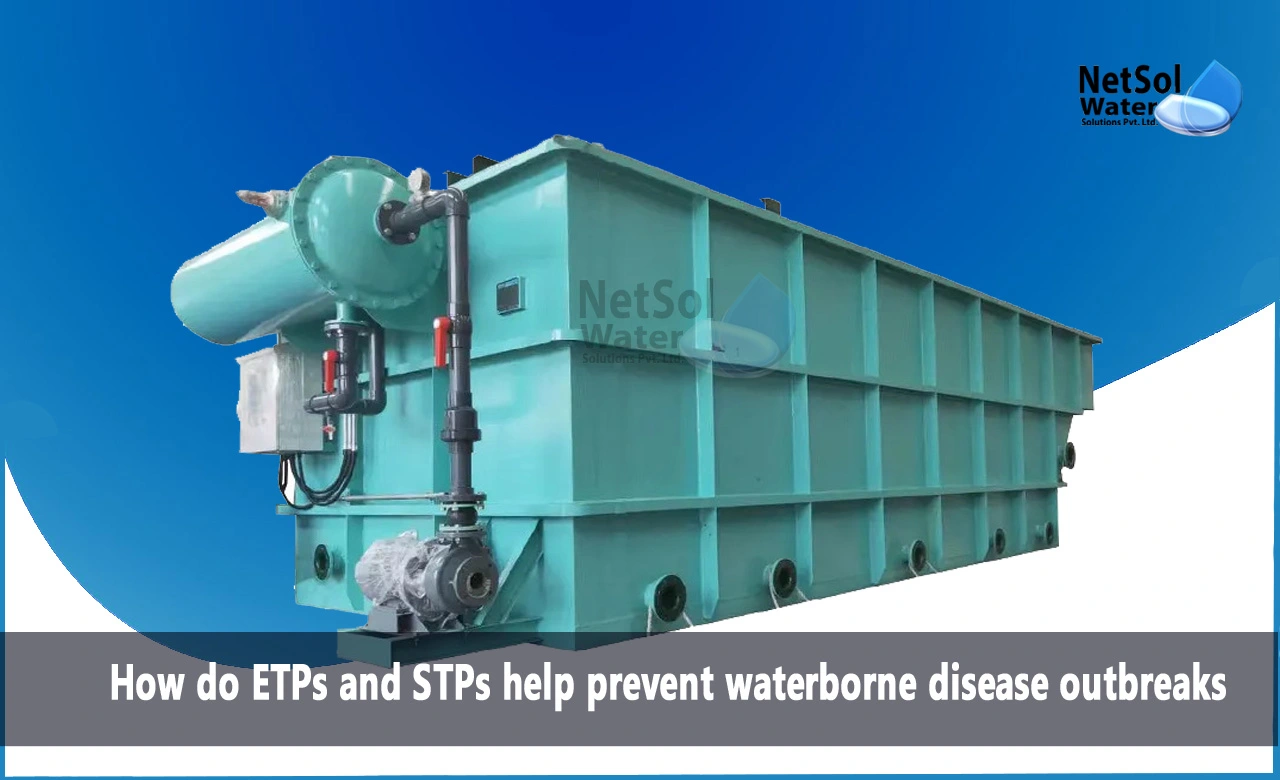How do ETPs and STPs help prevent waterborne disease outbreaks?
Water that is clean and safe is essential for human health and well-being. However, access to safe drinking water remains a problem in many regions of the world. Waterborne infections, produced by bacteria in polluted water sources, pose a serious hazard to public health, especially in places with inadequate sanitation infrastructure. By cleaning wastewater and reducing the spread of waterborne infections, Effluent Treatment Plants (ETPs) and Sewage Treatment Plants (STPs) play an important role in minimizing this hazard.
Understanding Waterborne Diseases:
Waterborne illnesses are caused by harmful microorganisms such as bacteria, viruses, and parasites that enter the human body by contaminated water consumption or contact with polluted water sources. Waterborne infections that are common include cholera, dysentery, typhoid, hepatitis, and other types of gastroenteritis.
The Role of ETPs and STPs:
Domestic and industrial wastewater is treated at Effluent Treatment Plants (ETPs) and Sewage Treatment Plants (STPs) before it is discharged into the environment. In the following ways, these treatment facilities serve a critical role in reducing waterborne illness outbreaks:
1. Pathogen Remova?l: To remove or inactivate hazardous pathogens from wastewater, ETPs and STPs employ a mix of physical, chemical, and biological processes. This involves reducing the number of bacteria, viruses, and parasites that may otherwise pollute natural water supplies.
2. Decomposition of Organic Matter: Organic matter in wastewater acts as a source of nutrition for harmful microbes. ETPs and STPs degrade organic debris in the water, making it less conducive to disease growth.
3. Disinfection: To further limit the prevalence of live pathogens, many treatment facilities integrate disinfection techniques like as chlorination or ultraviolet (UV) radiation. These safeguards guarantee that the treated water is safe for re-use or discharge into the environment.
4. Heavy Metals and Toxin Removal: ETPs may remove heavy metals and other hazardous compounds from industrial effluent. When swallowed by people or aquatic life, these pollutants can pollute water supplies and pose major health hazards.
5. Aquatic Ecosystem Protection: Treated wastewater is less hazardous to aquatic habitats. ETPs and STPs contribute to the ecological balance of water bodies by conserving aquatic creature health and lowering the danger of disease transmission within the ecosystem.
6. Contaminated Runoff Reduction: Untreated wastewater can permeate the earth, polluting groundwater and potentially reaching drinking water sources. ETPs and STPs reduce the danger of disease transmission through groundwater by preventing pollution.
Preventing Specific Waterborne Diseases:
While ETPs and STPs help to avoid a wide range of waterborne infections, the following instances demonstrate their direct impact:
· Cholera: Cholera is primarily waterborne and is caused by the bacterium Vibrio cholerae. This pathogen is considerably reduced in wastewater by ETPs and STPs, reducing its spread through water sources.
· Hepatitis A: This viral illness is frequently spread by fecal-oral contact. Proper sewage and wastewater treatment guarantees that the hepatitis A virus is not present in water sources.
· Giardiasis: Giardiasis is a parasitic infection often linked to contaminated water. ETPs and STPs aid in the removal of Giardia intestinalis cysts from wastewater.
· Cryptosporidiosis: Cryptosporidium is a protozoan parasite that, if consumed through contaminated water, can cause severe diarrhea.
Public Health Impact:
ETPs and STPs have a significant influence on public health. These facilities prevent waterborne illness epidemics by cleaning wastewater and removing microorganisms. As a result, there are numerous substantial public health benefits:
1. Reduced Incidence of Waterborne Diseases: Waterborne illness transmission is considerably reduced when wastewater is properly handled. As a result, infections including cholera, dysentery, and gastroenteritis are less common.
2. Better Child Health: Children are especially susceptible to waterborne infections. ETPs and STPs make clean and safe water available, which directly leads to better child health by lowering the prevalence of illnesses such as diarrhea.
3. Reduced Healthcare Costs: Prevention is less expensive than therapy. Using wastewater treatment to prevent waterborne illness epidemics lessens the strain on healthcare systems, saving resources and lives.
4. Economic Advantages: Waterborne infections can result in lost production owing to illness as well as higher healthcare expenditures. ETPs and STPs contribute to the economic well-being of communities by avoiding these illnesses.
Environmental Conservation:
ETPs and STPs assist to environmental conservation by safeguarding water bodies from pollution, in addition to their direct influence on public health. As a result, clean water is available for a variety of purposes, including drinking, agricultural, and industrial activities.
Conclusion
Effluent Treatment Plants (ETPs) and Sewage Treatment Plants (STPs) are critical components of contemporary sanitation infrastructure because they serve as the first line of defense against waterborne infections. These facilities serve an important role in protecting public health and environmental preservation by removing or inactivating pathogens, decomposing organic materials, disinfecting, and performing other treatment procedures. Investing in and maintaining ETPs and STPs is a critical step in ensuring urban and rural communities have access to clean and safe water, eventually preventing waterborne illness outbreaks and improving the well-being of communities worldwide.
Netsol Water is Greater Noida-based leading water & wastewater treatment plant manufacturer. We are industry's most demanding company based on client review and work quality. We are known as best commercial RO plant manufacturers, industrial RO plant manufacturer, sewage treatment plant manufacturer, Water Softener Plant Manufacturers and effluent treatment plant manufacturers. Apart from this 24x7 customer support is our USP. Call on +91-9650608473, or write us at enquiry@netsolwater.com for any support, inquiry or product-purchase related query.



